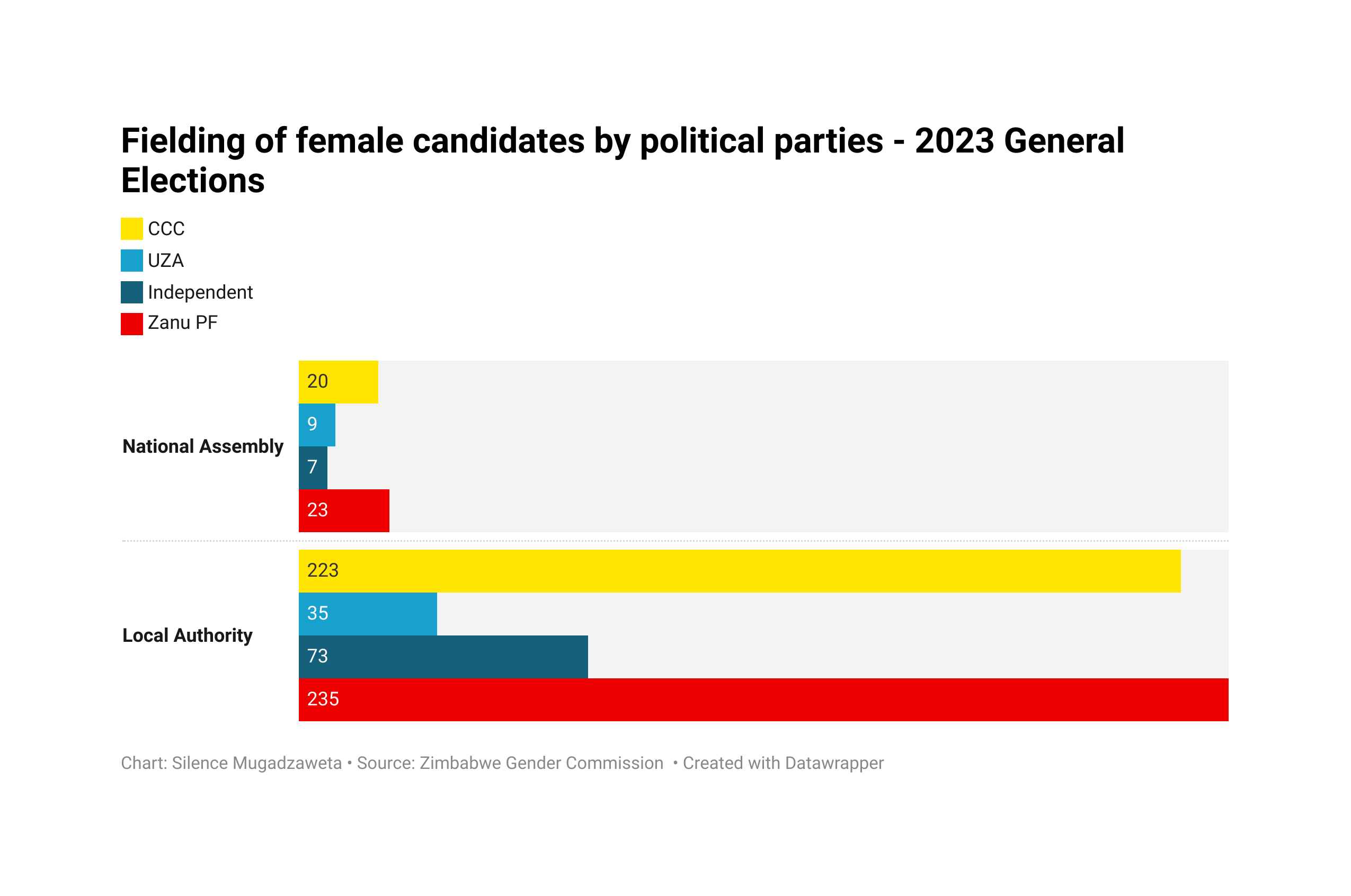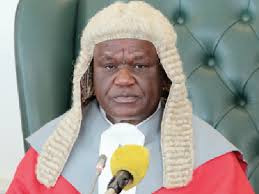
Elizabeth Valerio, who was the only female presidential candidate in Zimbabwe’s chaotic 2023 harmonised elections, had to fight tooth and nail to be on the ballot.
As the leader of the opposition United Zimbabwe Alliance (UZA), Valerio needed the intervention of the Electoral Court to run against President Emmerson Mnangagwa and the other nine male candidates in the polls after the Zimbabwe Electoral Commission had rejected her nomination with claims that her papers were submitted late.
The businesswoman’s struggles exposed the gaps in Zimbabwe’s laws that made women’s participation in local politics a herculean task.
“We don’t have necessarily a legal framework that truly is embracing of every citizen and looks at what is right and what’s wrong, there is some influence and interference,” Valerio said.
In Zimbabwe, the journey towards gender equality in politics remains fraught with challenges and the 2023 election debacle was a stark reminder of the systemic barriers that women face in the political arena.
The constitution promotes equal representation of men and women for all political positions, yet the reality falls short.
A 15-year regression on gender balance in political representation paints a gloomy picture on women’s representation in politics for Zimbabwe.
The participation of women fell from 12% in 2013 to 10.9% in 2023 for the national assembly.
- Chamisa under fire over US$120K donation
- Mavhunga puts DeMbare into Chibuku quarterfinals
- Pension funds bet on Cabora Bassa oilfields
- Councils defy govt fire tender directive
Keep Reading
For the local authority, it fell from 16.2% to 12.6% during the same period.

The 2023 election had only one female presidential candidate compared to four in 2018.
According to UN Women, women in Zimbabwe hold only 12% as members of deliberative bodies, and a mere 24% in ministerial positions.
These numbers highlight the persistent gender gap, and the need for more robust measures to ensure a level playing field.
Several factors such as cultural norms have been cited for contributing to the low participation of women in politics.
The political landscape is also marred by violence and intimidation, which disproportionately affects women candidates.

Economic disparities also play a significant role, as women often lack the financial resources necessary to run effective campaigns.
While there is enough legal framework to promote equal representation in politics, the Zimbabwe Gender Commission has noted that there are still gaps obstructing women to participate in politics within political parties as they are the main gatekeepers.
This includes misalignment of party constitutions to the national constitution on gender equality.
The commission has also noted that there is hardly any support for female candidates, training, resources and financial muscle to back the female candidates compared to their male counterparts.
Valerio said there was need for strict enforcement and adherence to current regulations to achieve equal representation.
“I’m not a huge advocate for more and more policy and legislative agendas,” she said.
“Although I think there are certain aspects of the law that need to be reviewed like policies around how the electoral commission appoints its commissioners, it is a big one for me.
“The electoral commission needs to be representative of all political players and we are fundamentally already at a disadvantage by the way that the commissioners are appointed and the oversight of the president and his political reach within the Zimbabwe Electoral Commission, so, there is a major issue there from a policy framework standpoint.”
Valerio said there was complete disregard of current policies and legislation on equal representation and protecting women against violence during elections.
“We have a constitution that guides us, we have electoral laws that guide us, what we lack is the implementation of those frameworks and until we have politically accountable individuals who are in the right offices we are going to continue to meander and then come up with more and more ideas and agendas to fix a problem which should be fixed by the people who are in the very institutions right now,” she said.
“When you think of the issues we are facing around violence at elections we’ve got more than capable police frameworks, they have their clearly laid frameworks...but are they actually doing what they are supposed to do?
“The answer is most likely no.
“We don’t have necessarily a legal framework that truly is embracing of every citizen and looks at what is right and what’s wrong, there is some influence and interference.”
If the current trend persists, it will take 130 years to achieve gender equality in the highest positions of power according to UN Women.
Statistics by UNDP show that 34 women in 31 countries were serving as head of state or government, with 22.8% of government being women.
On achieving a quota of 50% or more women in cabinet and national parliaments, 13 countries have recorded success.
But only 26.5% of members in lower houses were women as of January 2023.
“Until we have sound institutions with accountability, checks and balances to avoid being penetrated by corrupt devices, we are not going to get there no matter how much legislation we have,” Valerio said.
“It is going to also require having those sound solid institutions functioning properly upholding what has been mandated to them.”
Valerio said political parties had a huge responsibility to demystify the myth that politics is a death trap in Zimbabwe, a situation that she argued has induced hesitation and fear in women who are eager to participate.
“We really have to work harder at making sure that when these incidents occur (violence) there are consequences because perpetrators of violence in politics often end up getting away with it and nobody addresses the issue,” she said.
“It becomes lip service that we have a police force with a role to play in protecting and facilitating a safe, free, fair election.
“Until we start seeing consequences for these incidents, we will continue to lose women's engagement.”
Aspiring 2023 presidential candidate, Linda Masarira, said the political arena was systematically highly monetised to elbow out other contenders.
Masarira failed to raise the mandatory US$20 000 nomination fees.
Nomination fees for presidential candidates were exponentially high compared to the previous elections.
Presidential candidates were required to pay US$20 000, compared to US$1 000 in 2018.
Aspiring MPs paid US$1 000, up from $50 in 2018.
Masarira said besides resource constraints, societal stereotypes have a significant share of challenges that impede women from participating in politics.
“Politics has always been associated with bad things like violence and prostitution,” Masarira said.
“The moment you become opinionated, you attract negativity and labels and many people are not comfortable with their immediate family reading so much negativity about them and this becomes a huge barrier for women who want to enter into politics.”
Executive director for Women in Politics Support Unit, Sakhile Sifelani-Ngoma, bemoaned the lack of political will to guarantee fair participation in politics.
“If you look at the current legal framework and the current measures that Zimbabwe has, and compare to our history since 1980, coming to present days, we have a lot of enablers,” she said.

“What is currently distressing is the fact that we are not getting constitutional adherence and we should not go into doing additional policies to compel Zimbabwe and citizens to respect the law in different parts of society,”
Looking into 2028, Sifelani-Ngoma said consideration should be placed on strengthening the Electoral Act to prevent a repeat of 2018 where 19 political parties failed to field a single woman candidate for the national assembly direct elect seat.
She argued the Political Parties (Finance) Act needs to be expanded to ensure that public financing of political parties includes the inclusion of women, aligning with constitutional standards.
“We are really looking forward to make sure we ring fence the gains that the Constitution has already set for us within subsidiary law, particularly the Electoral Act, Political Parties (Finance) Act and of course the Gender Equality Act which is something we have been calling for from the women’s sector for some time,” Sifelani-Ngoma said.
“We are keen on seeing the Ministry of Justice table a Gender Equality Act that is robust, that is going to make sure issues of gender equality become tangible not just in the electoral space but also in in all public spaces and we have a robust framework for compelling people to respect the 50/50 agenda.”
Sifelani-Ngoma said ahead of the 2028 polls, all forms of violence against women should be condemned and perpetrators held accountable.
As Zimbabwe continues to strive for gender parity, it is imperative to address challenges head-on, she said.
Ensuring a level playing field for women in politics is not just a matter of fairness, but a necessary step towards a more inclusive and representative democracy.










